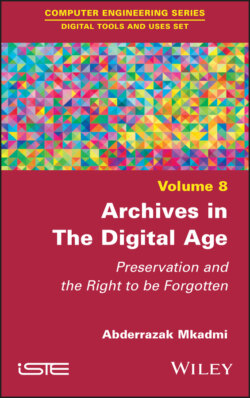Читать книгу Archives in the Digital Age - Abderrazak Mkadmi - Страница 5
Оглавление
Preface
Digital archiving is not storing data, but rather keeping it in an intelligent way in order to be able to exploit it over time while maintaining its integrity and authenticity. With the rapid transformations caused by the use of computer tools, several types of documents are nowadays stored with and served by archive services: email, databases, digital photographs, digital audiovisual content, exchanges on social media, etc. We are thus witnessing an evolution of the concepts and practices in the human and social sciences toward what we call “digital humanities”. This has led to the development of new tools and applications that promote access to and use of archives. At the same time, there has been an explosion of documents and information emanating from, inter alia, mobile technologies, social media, online transactions and connected sensors, which must be collected, preserved and disseminated. Commonly known today as Big Data, these megadata use very powerful technologies, which tend to store everything and for a long period of time. However, this concern to preserve everything in the name of the right to remember is confronted with another right, that of being forgotten. This right is often linked to the freedom of individuals who are condemned to living without privacy and freedom by being faced with the mistakes of their past.
This book attempts to provide a general overview of the complexity of the evolution of the concept of digital archives through three dimensions: human and social, technical and legal. It first presents the contours and necessary elements of its definitions, as well as the methods and strategies of digital archiving while presenting the normative landscape governing the field. The book then details the changes undergone by archives in the digital humanities in terms of content, media, preservation and access. It then tries to show the extent to which the arrival of Big Data has changed the work of archivists. The challenge is to process more data, at a lower cost and in a shorter timeframe. In this context, blockchain as a decentralized and distributed registry is presented as a complementary solution to digital archiving. Finally, special attention will be given to the legal and technical dimensions of archive processing through the right to be forgotten.
January 2021
